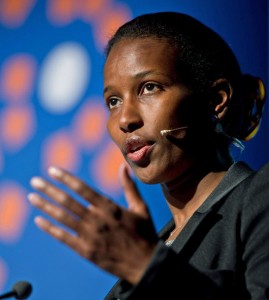A few weeks ago, Brandeis University announced that Ayaan Hirsi Ali would be the recipient of an honorary degree. Controversy followed the announcement, encompassing those who believed that Ali follows the steps of Louis Brandeis (the man who the University was named after), those who think she is not as conservative as she could be (depending on the context), and those who characterize Ali as an Islamophobe.

I must be honest. I wasn’t particularly surprised when she was nominated for an honorary degree, and I won’t be surprised in the coming years if she receives an honorary degree from another university or something along the lines of a human rights prize. My lack of surprise does not come from any kind of sympathy for Ali; not only has her book Infidel: My Life made my extended family believe that Muslims are extremely dangerous, but her right-wing associations, which draw the support of conservative media outlets, seem to me extremely paradoxical given that her experience includes working with Somali immigrants in Netherlands and later advocating their assimilation upon arrival in the country.
Nonetheless, there are bigger issue to explore. The fact that Brandeis University decided to grant Ali an honorary degree speaks of a broader support base that nominated her in the first place. Recommending someone for such an honour is not a simple process and normally requires extensive research and endorsement from committee members (see Brandeis University’s procedures). This implies that she has support within the academic community and those with close ties to power.
Ali does not only have academic support, but also a willing-media cohort waiting to hear what she has to say. A recent article in the National Post argues that Ali has been made into “villain.” Given that there are much better candidates for this position, like Boko Haram (which I wrote about recently), why would someone like Ali be turned into a “bad person”? Not only that, but the question is asked, why is Ali dismissed when we put so much faith in Abu-Lughod’s “highly anecdotal” work? (Our reviews of Abu-Lughod’s recent book are available here, here and here).
I do not know Ali personally so I can’t judge her character (even though I have the feeling that we wouldn’t get along!) but much of her work is purely anecdotal. In fact, she is known less for her accomplishments and more for her Somali background, forced marriage and immigration controversy in the Netherlands. She is also known for her passionate dislike of Islam based on her own personal experience and the challenges she has caused to those who fight injustice in Muslim communities, something that Rochelle Terman explores in a recent article. Whereas Abu-Lughod, a respected academic, does not deny that Muslim women face injustice, poverty and oppression, she advocates for self-emancipation rather than “imposed freedom.”
I personally don’t think that Brandeis University’s withdrawal of the honorary degree means much. On the contrary, Ali’s support remains strong within the academic world and right now is just laying low. Sympathy for Ali has been in the media since the whole incident became public, and we are told that Ali’s freedom of expression is being curtailed by Muslims and left-wingers who believe Ali is an Islamophobe. Unfortunately, some powerful media outlets will continue to give Ali the space to say who the “real villains” in Islam are, and what policy-makers should do about them.
Honorary degree or not, Ali continues to provide right-wing Islamophobes with an excuse to say: “If a black woman who was raised as Muslim speaks against it, then it is bad for sure.” Never mind other voices of women of colour who denounce voices like Ali’s. I guess those opinions being shut down are not “Muslim” or of “colour” enough to qualify as “freedom of expression.” This time around, Brandeis University, whether out of fear of losing credibility or actual concern, decided to respond to the voices of those who do not believe Ali’s portrayals of Muslim women are worthy of an honorary degree.












